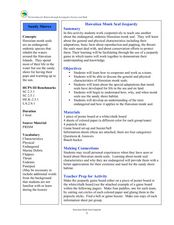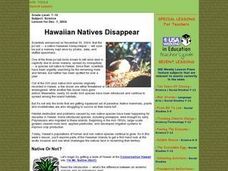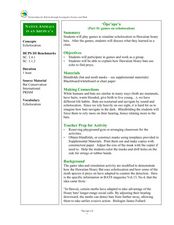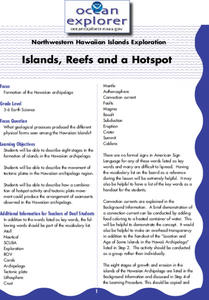Curated OER
Welcome! With a Hawaiian Lei
Students explore Hawaiian customs and tropical flowers used to make leis. They adapt one colorful Hawaiian tradition to their classroom or school. Students create colorful paper leis with which to welcome classroom guests. They are told...
Curated OER
Build a Hawaiian Bird
Fifth graders make a model of a bird. For this animal adaptations lesson, 5th graders examine how birds adapt to their environment, using Hawaiian birds as an example. Students create their own bird using adaptation paper cut outs then...
Curated OER
Create a Hawaiian Tako Lure
Students create a tako lure. In this Hawaiian culture lesson, students research how Hawaiians use natural resources to survive. Students are introduced to new vocabulary and create an octopus lure.
Curated OER
Northwest Hawaiian Islands
Students compare and contrast places around the world. Students analyze the effects of human activity on the physical environment and devise plans to address the consequences. Students also focus on geographical topics such as formation...
Curated OER
Exploring Hawaiian Mountain Zones
Fourth graders watch a video that describes the climate and vegetation zones of Hawaii. They describe the different physical conditions that create vegetation zones from the sea to the mountains. In groups, they create an illustrated...
Curated OER
Hawaiian Monk Seal Jeopardy
Students explore the Hawaiian monk seal. For this science lesson, students read about the monk seal and participate in a game in which they answer questions about the Hawaiian monk seal.
Curated OER
Dry-Land Kalo-Growing New Plants from Stems
Students explore Hawaiian plants. In this Hawaii culture and botany instructional activity, students plant the haha(stem) of a taro plant. Students listen to Hawaiian myths about the taro plant and chorally speak a Hawaiian chant of...
Curated OER
Hawaiian Natives Disappear
Students explore parts of the Hawaiian Islands to get a examine the exotic invasion, and see what challenges the natives face in reclaiming their territory. They identify the changes in the environment that have been the hardest on the...
Curated OER
Roots of the Hawaiian Hotspot
Learners explain the processes of plate tectonics and volcanism that resulted in the formation of the Hawaiian Islands. They describe, compare, and contrast S waves and P waves. They explain how
Curated OER
Games on Echolocation
Get a little batty with life science! This fun simulation game replicates how bats use echolocation to hunt moths in their native Hawaiian habitat. After creating blind folds and discussing some basic principles of echolocation, students...
Channel Islands Film
Island Rotation: Lesson Plan 3
How far have California's Channel islands moved? What was the rate of this movement? Class members first examine data that shows the age of the Hawaiian island chain and the average speed of the Pacific Plate. They then watch West of the...
Curated OER
Life Cycle of Hawaii's Honu
Students simulate the life cycle of Hawaii's Honu. In this Science lesson, students act out the life cycle of the Hawaiian sea turtle. Students determine and play the roles of prey and predator.
Curated OER
What is an Ahupua'a?
Students research ahupua'a ecosystems. For this ahupua'a lesson, students explore how land is subdivided in Hawaii and the effect on the ecosystem. Resources are provided.
Curated OER
Islands, Reefs, and a Hotspot
Learners describe eight stages in the formation of islands in the Hawaiian archipelago. They examine the movement of tectonic plates in the Hawaiian archipelago region, and describe how plate movement produced the Hawaiian archipelago.
Curated OER
Seals, Corals, and Dollars...
Students explore the interdependence of animals and their habitat. In this Hawaiian ecology lesson, students work in groups to research the necessity of preserving precious coral as a habitat for monk seals. Students prepare and share...
Curated OER
Hawaiian Bird Beak Adaptation
Learners explore adaptation by participating in a lab activity. In this bird characteristics lesson, students discuss the different purposes birds have for their beaks and conduct an experiment testing which beaks collect food best....
Curated OER
Lesson 12: Ho'olaulima: Let's Make a Hawaiian Garden
Second graders grow a classroom garden that acts as a living laboratory for cross-curricular activities. In this classroom garden lesson, 2nd graders follow directions to build and plant a garden that is used to teach math, science, and...
Curated OER
Hawaiian Bowl!
Students describe the movement of tectonic plates in the Hawaiian archipelago region. They describe how a combination of hotspot activity and tectonic plate movement could produce the arrangement of seamounts obse
PBS
Breaking it Down
After challenging themselves to correctly choose the form of erosion and length of time required for a given landform to develop, earth science class members model mechanical and chemical weathering with various lab demonstrations over...
NOAA
The Biggest Plates on Earth
The deepest part of the ocean is the Marianas trench where two tectonic plates meet. Scholars explore plate tectonics and their boundary types by completing hands-on activities throughout the lesson. Specific areas, such as the Galapagos...
NOAA
Exploring Potential Human Impacts
Arctic sea ice reflects 80 percent of sunlight, striking it back into space; with sea ice melting, the world's oceans become warmer, which furthers global warming. These activities explore how humans are impacting ecosystems around the...
Curated OER
Energy Flow and the Food Chain
Learners complete discussions and worksheets about the Hawaiian food chain. In this food chain lesson plan, students research decomposers, consumers, and producers.
Curated OER
Hawaiian Hot Spots
Students describe how plate tectonics contribute to the development of volcanoes. In this earth science lesson, students examine the map of Hawaii and explore the physical and biological environment there. They write a story about an...
Curated OER
Kinds of Volcanic Eruptions
In this volcanic eruption worksheet, students will read descriptive information about four types of volcanic eruptions: Hawaiian, Strombolian, Vulcanian, and Pelcean. Then students will identify 4 figures of eruptions as one of these...
Other popular searches
- Hawaiian Music
- 8 Hawaiian Islands
- Hawaiian Culture
- Hawaiian Islands
- Hawaiian Marine Biology
- Hawaiian Ecosystem
- Hawaiian Studies
- Hawaiian History
- Hawaiian Dance
- Hawaiian Archipelago
- Hawaiian Music Activities
- Hawaiian Mythology

























